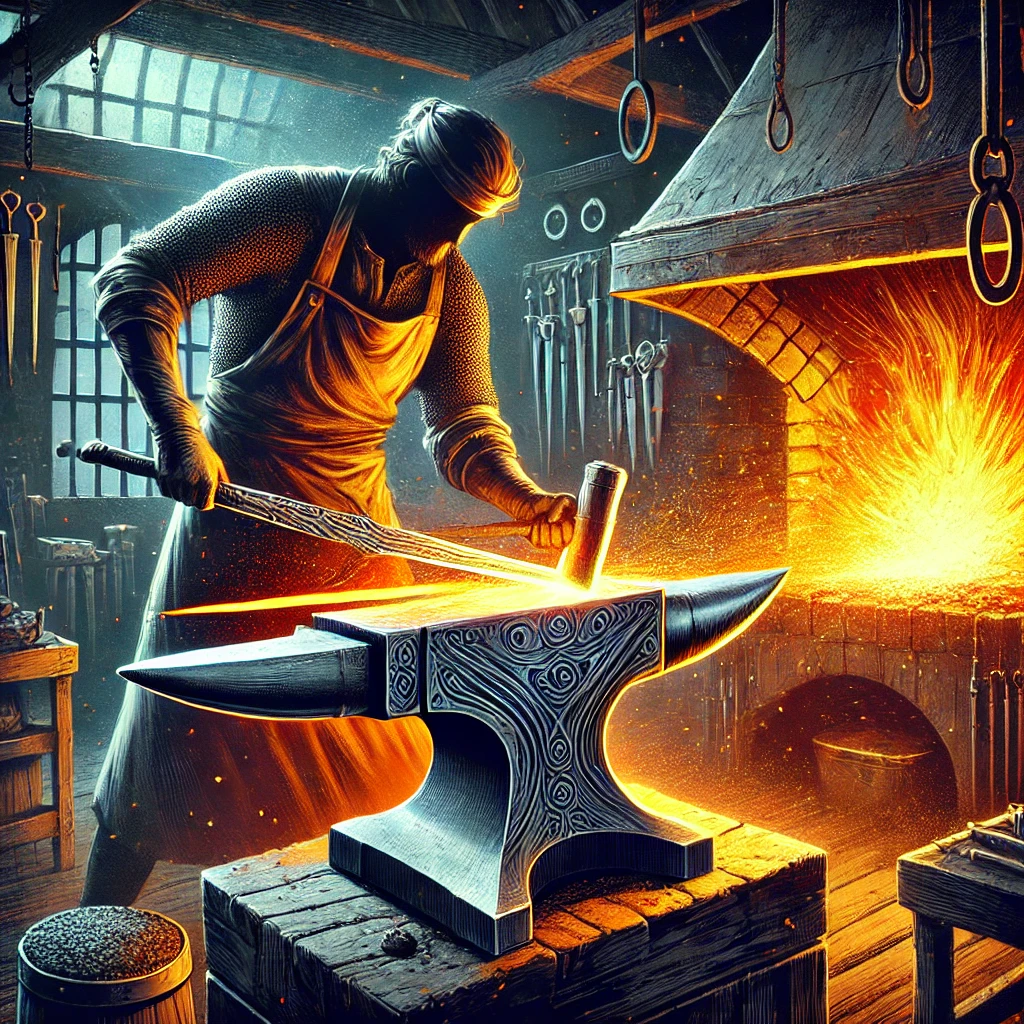Forge
Definition
Forge primarily refers to a furnace or workshop where metal is heated and shaped, especially to make tools or weapons. Additionally, it can refer to the act of creating or imitating something fraudulently.
Parts of Speech
- Noun
- Verb (transitive, intransitive)
Pronunciation
American English
- IPA Pronunciation: /fɔrdʒ/
- Respelling: FORJ (with "FOR" as in "fort" and "J" as in "judge")
British English
- IPA Pronunciation: /fɔːdʒ/
- Respelling: FAWRJ (with "FAWR" as in "fort" and "J" as in "judge")
In both dialects, "forge" places the primary stress on the entire syllable. The pronunciation is similar across both American and British English, focusing on the clear articulation of "FORJ" in American English and "FAWRJ" in British English.
Etymology
The word "forge" comes from the Old French "forgier," meaning "to create, build, or shape," which itself is derived from the Latin "fabricare," meaning "to make, construct." The noun form also comes from the Latin "fabrica," meaning "a workshop" or "craftsmanship." The term has been used in English since the 14th century, with both its literal and figurative meanings developing over time.
Derivatives
- Forgery (noun)
- Forging (noun/verb)
- Forgeable (adjective)
- Forger (noun)
- Forged (adjective/verb)
Synonyms
- Smithy (for the furnace definition)
- Fabricate (for the creation definition)
- Counterfeit (for the fraudulent imitation definition)
Antonyms
- Dismantle
- Genuine
- Destroy
Usage
The term "forge" is used in various contexts, from metalworking to the creation of ideas or relationships. In its literal sense, it refers to the process of shaping metal by heating and hammering, a technique used by blacksmiths. Figuratively, it can mean to create something strong or lasting, such as a relationship or an alliance. However, it also has a negative connotation when used to describe the creation of false or fraudulent items, such as documents or signatures.
Related Terms
- Anvil
- Metalwork
- Smithing
- Fabrication
- Counterfeiting
Detailed Definition
Noun
- A Place Where Metal is Shaped: Refers to a furnace or workshop where metals are heated to high temperatures and shaped by hammering or pressing.
- Example: The blacksmith worked tirelessly in the forge, creating horseshoes and tools.
- The Act of Forging: The process or craft of working with metal in such a workshop.
- Example: The art of the forge has been passed down through generations.
Verb (transitive, intransitive)
- To Form or Shape by Heating and Hammering: Used to describe the act of creating metal objects by heating and then hammering or pressing them into shape.
- Example: The artisan forged a beautiful sword from the raw iron.
- To Develop or Create: Used metaphorically to describe the act of creating something strong or enduring, such as a relationship, alliance, or agreement.
- Example: The two countries forged a strong alliance through years of cooperation.
- To Create a Counterfeit: Refers to the illegal act of making a false version of something, typically a document, signature, or currency, with the intent to deceive.
- Example: He was arrested for attempting to forge a signature on the legal document.
forge



🇨🇳 Mandarin
- 锻造 (duàn zào)
- IPA: [twàn tsâu]
- Respell: dwan tzao
- 伪造 (wěi zào)
- IPA: [wèi tsâu]
- Respell: way tzao
🇮🇳 Hindi
- गढ़ना (gaṛhnā)
- IPA: [ɡəɽʱnaː]
- Respell: guh-rh-naa
- जाली बनाना (jālī banānā)
- IPA: [d͡ʒaːliː bənaːnaː]
- Respell: jaa-lee ba-naa-naa
🇪🇸 Spanish
- Forjar
- IPA: [foɾˈxaɾ]
- Respell: for-har
- Falsificar
- IPA: [falsifiˈkaɾ]
- Respell: fal-see-fee-car
🇫🇷 French
- Forger
- IPA: [fɔʁʒe]
- Respell: for-zhay
- Falsifier
- IPA: [falsifje]
- Respell: fal-see-fee-ay
🇸🇦 Modern Standard Arabic
- تشكيل (tashkīl)
- IPA: [taʃkiːl]
- Respell: tash-keel
- تزوير (tazwīr)
- IPA: [tazwiːr]
- Respell: taz-weer
🇧🇩 Bengali
- গঢ়া (gaṛha)
- IPA: [ɡɔɽʱa]
- Respell: go-rha
- জাল করা (jāl korā)
- IPA: [d͡ʒal kɔra]
- Respell: jaal kaw-ra
🇷🇺 Russian
- Ковать (Kovat')
- IPA: [kɐˈvatʲ]
- Respell: ko-vat
- Подделывать (Poddelyvat')
- IPA: [pɐˈdʲelʲɪvətʲ]
- Respell: pod-de-ly-vat
🇵🇹 Portuguese
- Forjar
- IPA: [foɾˈʒaɾ]
- Respell: for-zhar
- Falsificar
- IPA: [faɫsifiˈkaɾ]
- Respell: fal-see-fee-car
🇮🇩 Indonesian
- Membuat
- IPA: [məmˈbwat]
- Respell: mem-bwat
- Memalsukan
- IPA: [məmˈpalsukan]
- Respell: mem-pal-soo-kan
🇩🇪 German
- Schmieden
- IPA: ['ʃmiːdn̩]
- Respell: shmeed-n
- Fälschen
- IPA: ['fɛlʃn̩]
- Respell: fel-shen
🇯🇵 Japanese
- 鍛造する (tan zō suru)
- IPA: [tan zoː sɯɾɯ]
- Respell: tan zoh soo-roo
- 偽造する (gizō suru)
- IPA: [ɡizoː sɯɾɯ]
- Respell: gee-zoh soo-roo
🇻🇳 Vietnamese
- Đúc
- IPA: [ɗuk̚]
- Respell: duhk
- Làm giả
- IPA: [lam zaː]
- Respell: lam zaa
🇰🇷 Korean
- 제작하다 (jejakhada)
- IPA: [t͡ɕe.dʑak̚.ha.da]
- Respell: jeh-jak-ha-da
- 위조하다 (wijohada)
- IPA: [wi.dʑo.ha.da]
- Respell: wee-jo-ha-da
🇹🇷 Turkish
- Dövmek
- IPA: [døvˈmek]
- Respell: doov-mek
- Sahtekârlık yapmak
- IPA: [sahteˈkaːɾlɯk japˈmak]
- Respell: sah-teh-kar-luk yap-mak
🇵🇰 Urdu
- گڑھنا (garhna)
- IPA: [ɡəɽʱna]
- Respell: guh-rh-na
- جعل سازی (ja'alsaazi)
- IPA: [d͡ʒaːl saːzi]
- Respell: jaal saa-zee





